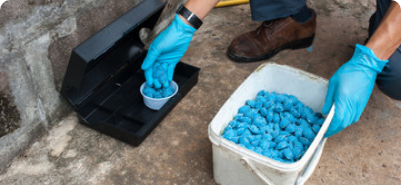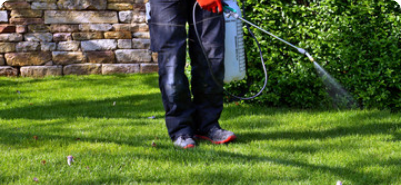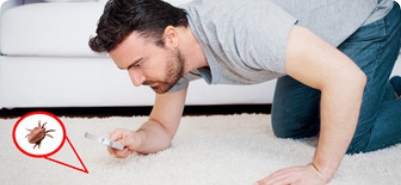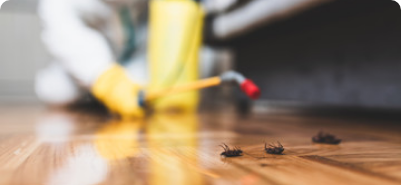Is it Safe to Have Rats in My Home?
No, rats pose serious threats to your home and health. These rodents cause extensive property damage by gnawing through electrical wires, insulation, and structural materials. They contaminate food supplies and spread dangerous diseases through their droppings and urine.
Rats can easily enter your home through small gaps and climb vertical surfaces. They make nests in hidden areas using materials they find around your house. Here are some signs that there may be a rat infestation in your home:
- Dark, rice-sized droppings near food sources
- Gnaw marks on wood, plastic, and cables
- Scratching sounds in walls or ceilings
- Grease marks along walls from their fur
Rats breed quickly, with female rats having multiple litters each year. This means that if you have a rat problem, it can escalate rapidly if not addressed. That’s why it’s important to seek professional help from pest control experts who specialise in rodent removal Sydney.
To prevent rats from entering your home in the first place, you’ll need to take proactive measures such as sealing any gaps or holes where they could get in and removing potential food sources like pet food or garbage. This is known as rodent prevention and is crucial in stopping infestations before they start.
What Diseases Do Rats Carry?
Rats transmit numerous serious diseases that pose significant health risks to humans. These rat diseases spread through direct contact, contaminated surfaces, and airborne particles.
Direct Transmission Diseases
Direct transmission diseases are those that spread directly from rats to humans without the involvement of any intermediate hosts. Here are some examples:
- Rat-bite fever: This is a bacterial infection that can occur when a person is bitten or scratched by a rat. Symptoms include fever, vomiting, and joint pain.
- Leptospirosis: This bacterial disease is transmitted through contact with infected urine. It can lead to liver and kidney damage, and is particularly concerning in areas with humid climates like Sydney.
- Lymphocytic choriomeningitis virus (LCMV): This viral infection can be transmitted through exposure to rat saliva or urine.
Vector-Borne Diseases Spread by Fleas
In addition to direct transmission, rats can also spread certain diseases through fleas. Here are two examples:
- Bubonic plague: This historic disease is still present in some regions today. It is transmitted by infected fleas that bite both rats and humans.
- Typhus: This bacterial infection causes high fever and severe headaches. It can be spread by fleas as well.
Airborne Contamination Risks
Some diseases can be contracted by inhaling contaminated particles in the air. Here are two such examples:
- Hantavirus pulmonary syndrome: This life-threatening respiratory illness is caused by inhaling dust particles that contain hantavirus, which may be shed in rat droppings or urine.
- Salmonellosis: This type of food poisoning occurs when a person consumes food or water that has been contaminated with Salmonella bacteria, which can sometimes come from rat sources.
Allergic Reactions
Exposure to rat droppings, dander (skin flakes), and hair can trigger allergic reactions in susceptible individuals. Common symptoms include asthma attacks, skin irritation, and respiratory problems. Children and elderly people are particularly vulnerable to these effects due to their potentially compromised immune systems.
Hantavirus Risk During Cleanup Activities
When cleaning areas where there have been heavy infestations of rats, it is important to be aware of the risk of hantavirus transmission. Proper protective equipment such as masks and gloves should always be used during any rat-related cleanup activities to minimise this risk.
Will Rats Attack Humans?
Rats actively avoid human contact and prefer to remain hidden during daylight hours. These rodents only become aggressive when cornered, threatened, or protecting their young. A trapped rat will bite or scratch as a defensive mechanism rather than an offensive attack.
How Rats Communicate and Detect Threats:
- Emit ultrasonic sounds beyond human hearing range
- Detect human presence through vibrations and scent
- Use whiskers to navigate and sense approaching danger
- Communicate warnings to other rats through pheromones
The Black Death pandemic of the 14th century demonstrates the serious health consequences when rat populations grow unchecked. Fleas carried by infected rats transmitted plague bacteria to humans, killing an estimated 75-200 million people across Europe and Asia.
Why Professional Rodent Threat Assessment is Important
Before rats exhibit defensive behaviour, it’s crucial to have a professional rodent threat assessment. Sydney pest control experts can identify early warning signs and implement targeted strategies. Waiting until rats feel cornered increases the risk of bites and allows populations to establish deeper infestations throughout properties.
Rodent control services in Sydney focus on prevention rather than confrontation, eliminating the conditions that lead to aggressive encounters between rats and residents.
Are Rat Droppings Toxic?
Rat droppings toxicity poses serious health risks through direct contact and airborne contamination. Fresh droppings contain harmful bacteria including Salmonella and E. coli, whilst dried droppings release dangerous particles when disturbed.
Safe cleaning of rat droppings in Sydney requires proper protective equipment:
- Wear disposable gloves and face masks
- Use disinfectant solutions before sweeping
- Avoid vacuuming which disperses particles
- Ventilate the area during cleaning
Inhaling contaminated dust particles can trigger respiratory infections and allergic reactions. Rat urine crystallises into airborne particles that carry pathogens directly into your lungs when breathed in.
Thorough sanitation prevents recontamination and deters future infestations. Clean affected surfaces with bleach solutions and dispose of contaminated materials in sealed bags. Professional cleaning becomes necessary for extensive contamination or when droppings appear in food preparation areas.
Get Rid of Rats with Andy’s Pest Control
Andy’s Pest Control delivers professional Sydney rat control services with proven methods that eliminate rodent infestations safely and effectively. Our rodent exterminator Sydney team maintains high standards whilst providing flexible, client-specific solutions for homes and businesses across the city.
Our comprehensive rat removal Sydney process includes:
- Thorough property inspection to identify entry points and nesting areas
- Customised treatment plans tailored to your specific infestation
- Targeted rodent treatment Sydney using safe, effective methods
- Entry point sealing to prevent future infestations
- Follow-up inspections to ensure complete elimination
We offer eco-friendly pest control Sydney options that are safe for children and pets. Our Sydney mice control services provide same-day treatment when needed, with competitive pricing and detailed inspections included in every service.
Ready to secure your property from rodents? Call Andy’s Pest Control today at 0485 900 290 for expert pest management.






